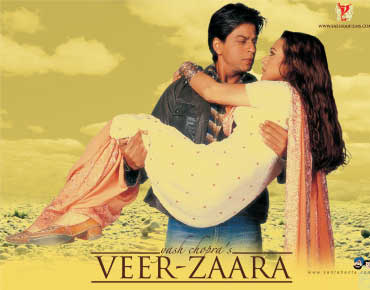

Yash Chopra returns to directing for the first time in a number of years (1997’s Dil to Pagal Hai being his previous effort) and he brings along many of his trademarks – high production values, a glossy colorful palette, lush musical numbers, loving mothers and an old fashioned high toned love story that does its best to ring out the tears. Indian cinema has been going through some dramatic changes over the past few years as filmmakers have attempted to overcome box office doldrums by adding more sexual content (Jism), exploring taboo subjects (lesbianism in Girlfriends), becoming more technically polished and reducing the traditional Bollywood aspects of films such as musical numbers and over sentimentality (Varma’s recent films). In other words – Indian films are taking on what is perceived as Western attributes – whether for good or ill is everyone’s decision to make. Not Yash Chopra though. He is in a bit of a time warp. Now at about 100 years old (ok – only 72) and having made these types of films for over forty years, Yash isn’t about to change what got him here and in Veer-Zaara he delivers it in spades. It is like submerging yourself in a honey pot – sticky but sweet.
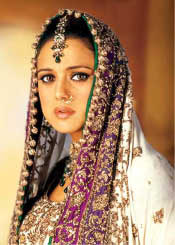
The film stars perhaps the three biggest actors in Bollywood right now – there practically isn’t a big release anymore that doesn’t feature one or more of them – Shahrukh Khan, Preity Zinta and Rani Mukherjee – and all of them are like fresh orange marmalade – they practically sparkle they look so good. Shahrukh recently said that he can make these types of films in his sleep now and that is easy to believe – not that he looks to be sleepwalking through his role, but he has all this down to a science by now – the easy going charm, the love struck gaze, the misty eyes, the quivering lip – he has done it so many times that I am sure it’s like a database in his head and he only has to reach for the right file to access. But it works – it is nearly impossible not to fall under his spell. Shahrukh is simply the most personable actor in the world today and though you feel you are being partly conned you happily go along for the ride. Preity is adorable – the flower bud lips, the famous dimples, the eyes that dance from glee to tragedy in an instant – she is like a rich wrapped chocolate that you just want to pop into your mouth and savior. She is wonderful here – as warm and welcoming as French toast under a thick layer of oozy syrup. Rani has perhaps the hardest role in the film as she has to play it completely straight with not a hint of glamour and not even a song to hang her hat on, but she is able to convincingly project an aura of integrity, idealism and compassion that her character needs. Even so not seeing Rani in at least one miniskirt during a three-hour movie should be considered a national disgrace!
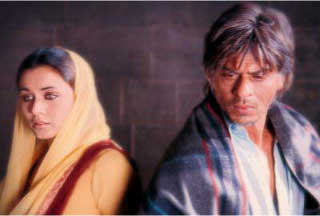
The film is structured in a compelling manner – it alternates between the present time and flashbacks to two decades before and so essentially creates two dramatic threads – one a typical Bollywood love story and the other a search for justice and identity. These two stories effectively manage to feed off one another and create large doses of pathos in doing so. Veer (Shahrukh) is serving time in a Pakistani jail – looking gaunt, disheveled and broken – not too surprising after twenty-two years behind bars. His prison number is 786 (apparently a very significant number in Islam because when written out in Arabic it looks like the word for God) and no one has spoken his name in all these years nor has he spoken a word. Pakistan is reviewing many of the older cases to see if justice was served and a new lawyer (Rani) has been assigned to his case. She is able to break through his long held silence by simply showing him some humanity and respect – and being Rani probably didn’t hurt – who could stay silent under the gaze of Rani. He begins to tell her his story and what brought him to this state.
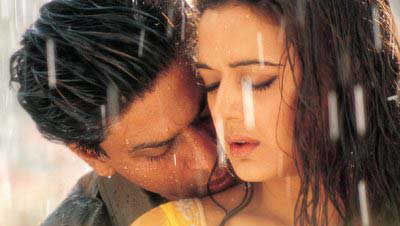
He was in the Indian air force working on a helicopter rescue squad when one day he had to pick up a young woman whose bus had crashed on the roadside leaving her stranded down below – the actual logistics of this make little sense – but never mind about that. As they are hauling her up and he is immersing himself into her big brown eyes, she drops her bag and insists on recovering it, which sets Veer off on an angry rather nonsensical tirade. Later Zaara (Preity) explains that the bag contains the ashes of her dear beloved nanny (Zohra Sehgal) whose last wish was to have them released in a holy Sikh river. Geez – talk about making someone feel guilty – even Shahrukh can’t respond to this except with a sheepish look, but the next day he decides to help this Pakistani girl in her mission and to go with her and her beautiful dimples. Until this point the film had felt rather contrived and somewhat ordinary, but beginning with their journey together across the idealized utopian Indian countryside the film begins to take on an emotional resonance that is quite magical. After finally reaching their destination, Veer asks her for one more day of her life to show her his India and takes her home to his small village where they meet up with his aunt and uncle (played by Hema Malini and Amitabh Bachchan with enormous affability).
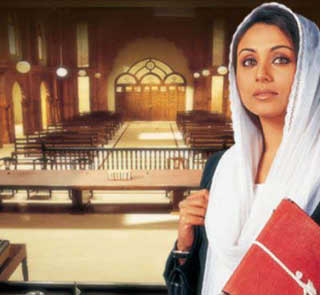
In there short time together it becomes clear to everyone that Shahrukh has fallen madly in love and it is not difficult to understand why – Preity is simply perfect – but she has forgotten to tell him one small thing – she is engaged to another man. This is Bollywood after all and love never comes easy. The film swings back and forth between past and present as the story unhurriedly unravels and grabs onto our emotions along the way. As these types of films tend to do, it is quite manipulative in its efforts to grab these emotions – utilizing basic Bollywood ingredients such as the now common high pitched singing in the background to highlight tragic moments – tears when needed – odes to motherhood and country – close-ups of Preity that could rip out any man’s heart – being caught in down pours of rain – a forbidden love that has to be overcome. Chopra uses whatever is needed to push our emotional buttons - even cheating rather badly in one instance - and most of it works though by the end I felt somehow distanced by such overt manipulation and refused to buckle completely. These were perfect people without a flaw - at one point Rani even wonders if Veer and Zaara were Gods disguised as people - not exactly the stuff of reality or complexity. Still for many of us this is exactly what we want from a Bollywood film – guilt free vicarious catharsis and beautiful people suffering.
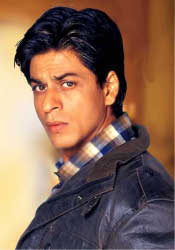
Above the main themes of love, honor and sacrifice, Chopra adds one that seems most near to his heart in these times and is perhaps the true point of this film. When so many Bollywood films over the past few years have dipped their pen in hatred and discrimination towards Pakistan and by association Islam – particularly repugnant and contemptible considering how many Muslims are in the business – Chopra sends out a message of religious and cultural tolerance that is most welcome. In his world people of different faith whether Muslim, Hindi or Sikh respect each other’s culture and accept one another. In a poem that Shahrukh writes, he speaks movingly of the commonality of people whether in India or Pakistan – how can we be so divided when we are all the same. Perhaps still idealized, but a message that needs to be heard even if only in a movie.
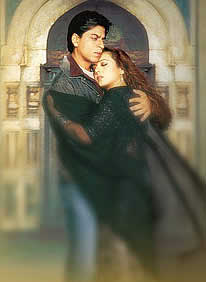
The film is assisted mightily by a very strong supporting cast not yet mentioned – Kiron Kher as Zaara’s mother, Manoj Bajpai as the fiancé (the villain of the piece but a very sympathetic one), Divya Dutta as Zaara’a maid and confidant, Anupam Kher as the opposing lawyer and Boman Irani as Zaara’s father. Another aspect of the film that I appreciated is the display of love and affection between Amitabh and Hema – unusual in any film industry to show people passed middle age still so in love. Their playful song to one another was the highlight of the film for me. Only a few things struck me negatively in the film – but I can’t really go into them without giving away spoilers and in the end they really don’t matter all that much. There is no room for cynicism here.
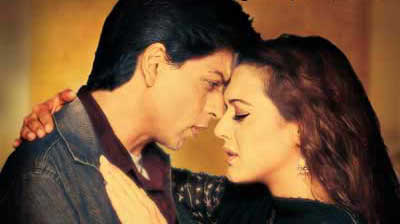
The music has an old fashioned feel to it as well – no synthesizer pop songs – but basic traditional Bollywood film music. This isn’t too surprising when one realizes that the composer Madan Mohan died in 1975 at the age of 51. Considered a top composer of his time, his debut as a composer was Aankhen in 1956 and he went on to compose numerous songs for the next twenty years – often utilizing the voice of Lata Mangeshkar who also sings in nearly every song here. Yash looked through many of his unpublished tunes and picked these out to use in his film and brought on Javed Akhtar to write lyrics to them. The music on its own (I picked up the CD weeks ago) stands up but doesn’t really reverberate – but when seen in the film it manages to engage one much more – it is nearly mood music pulling you into the film and into the emotions of the characters whether joy or despair.
My rating for this film: 7.5